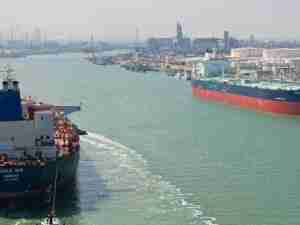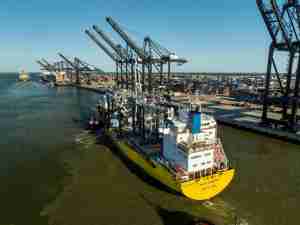Port of Melbourne Valued at Up to $6 Billion, Andrews Says
By: Jason Scott and Brett Foley | Jun 01 2016 at 01:27 AM | Ports & Terminals
Australia’s Victoria state is “very confident” the winning bid for a 50-year lease to operate the Port of Melbourne, which is valued at between $4 billion and $6 billion, will exceed the book price, state Premier Daniel Andrews said.
“All the market expectation, all the commentators talk about us exceeding the price that we’ve booked, and we are very confident given it’s such a prized asset,” Andrews said in an interview with Bloomberg Television in New York on Tuesday. “We are confident we’ll get a very good price” for Australia’s busiest container terminal, he said.
The port sale will help Victoria, the nation’s second-largest state economy, to build a new Melbourne underground rail tunnel and remove 50 rail level crossings, which is expected to cost as much as A$6 billion ($4.3 billion). It comes amid a flurry of infrastructure privatizations as Australia’s regional governments sell assets to help fund new roads, rail and other projects.
Bidding Groups
Australia’s QIC Ltd. plans to bid for Port of Melbourne with Global Infrastructure Partners and Borealis Infrastructure Management Inc., while IFM Investors Pty has joined with Macquarie Infrastructure and Real Assets fund and Dutch pension fund APG Groep NV, people familiar with the matter said in April.
A consortium of Chinese investors led by a Zhejiang port group also plans to bid for the asset, people with knowledge of the matter said. Another grouping including Hastings Funds Management Ltd., Kuwait’s Wren House Infrastructure Management Ltd. and Canada’s Alberta Investment Management Corp. dropped out of the bidding last week, the people said.
A spokesman for Victorian Treasurer Tim Pallas declined to comment on the bidders, citing confidentiality. A Sydney-based spokeswoman for Hastings Funds Management last week declined to comment, while a Zhejiang provincial government agency in charge of state-owned companies didn’t immediately respond to an e-mailed request for comment or answer phone calls Wednesday.
The previous government valued the port at A$5.3 billion during the year to June 30, Pallas said in March. It is the country’s largest maritime hub and handles almost 2.6 million containers annually and about 1,000 motor vehicles a day, according to its website.
Potential builders and financiers have also shown interest in Melbourne infrastructure projects, including a $7.5 billion metropolitan rail tunnel and a $4 billion road project connecting the western suburbs to the city, Andrews said. The state wants to see continued demand from overseas buyers for its real estate, he said. Melbourne’s property prices surged about 70 percent since the end of 2007.
“We need to make sure that we continue to invest to get the diversity in our Victorian economy that we need, but we’re confident we’re going to continue to see a lot of overseas interest, a lot of domestic interest” in real estate, Andrews said.










